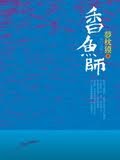But that doesn't mean I'm not reading anything else. There's been a rekindling of interest in Japanese novels/short stories/mysteries, so I currently have these books I'm about to read (finished one of them, actually):
《千年繁華-京都的街巷人生》(壽岳章子)
While I was browsing the shelves at Flushing Library, this book immediately had my attention. There is nothing extraordinary about a travelogue of Kyoto, that is to say, it is as extraordinary as the next travelogue of any other place. But what makes this particular book stand out is the carefully drawn pencil sketches of everyday scenes of Kyoto, which accompany the texts. The sketches (I think they were done using graphite or maybe charcoal) are endearing, and they somehow make the texts more enticing. I haven't really begun this book, but a quick skim was enough to show that the writing is typical of Japanese female writers -- soft, exquisite, devel-in-the-detail. The book was written almost a century ago, but as a travelogue, it is still very relevant. I think the author wrote not so much about the places themselves as her family which spent their lifetimes in this ancient city that bears so much weight from its past.
《香魚師》(夢枕貘/ばく ゆめまくら)
I've been a long term fan of Baku Yumemakura's Onmyoji series (陰陽師). It is rare that I happen to like every form of adaptation of a piece of work, but in the case of Onmyoji, it is pretty much the case: I like the original stories themselves written by Baku Yumemakura, I like the manga series created by Reiko Okano (岡野鈴子), and I like the movie adaptation with Abe no Seimei played by Nomura Mansai (野村万齋). So I am eager to try some of Baku's other books. This book seems to be about fishing sweetfish (ayu/Plecoglossus altivelis). But its not about fishing at all, its about the people who go fishing.
《東京奇譚集》(村上春樹)
If nothing else works, pick anything by Murakami Haruki. I've not read ANY of Murakami's short stories, so I thought I'd give it a try. I've only read the first story in this little collection, but already, there seems to be a personal connection. I wrote a short blog about sometimes, there are signs around us that if you watch or listen carefully, you might catch them. I don't know if the signs are always there, but for myself, I don't pay attention to them unless I'm in some sort of dilemma and I can't straighten it out, and then I seem to find these little signs. These signs guide and advise, and heeding them might turn out to be significant, or not in one's life. So anyways, the first story in this collection has to do with signs in our lives.
《分身》(東野圭吾)
Higashino Keigo's works are not new to me. The well-known detective drama "Detective Galileo" (神探加利略)was based on his books. Actually, after seeing some of his photographs, I sensed a slight resemblance between him and Masaharu Fukuyama (福山雅治)--the actor who played Professor Galileo!!! How uncanny!! I finished reading Bunshin (分身). The truth is, this book actually made me feel sick towards the end. The book touches upon the highly controversial issue of human cloning. The rather taken-it-for-granted tone with which the author tells the story about the repeated cloning of a woman in the book makes me queazy. I understand this book is essentially a mystery thriller, and that cloning is merely a piece of the bigger puzzle necesary to unfold the mystery, but still, I felt a bit repulsed by it. I read another of his book a while ago and loved it immensely:




